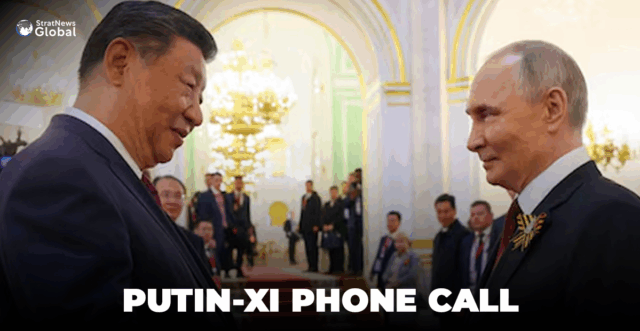Russian President Vladimir Putin and Chinese President Xi Jinping held a phone call on Thursday to discuss perceived discord among G7 leaders at this week’s summit, according to the Kremlin.
At the meeting in Canada, the bloc of wealthy nations struggled to find unity over the war in Ukraine after U.S. President Donald Trump expressed support for Putin and left a day early to tackle the Israel-Iran conflict from Washington.
His departure deprived Ukrainian President Volodymyr Zelenskyy of a chance to meet him and press for more U.S. weapons.
Putin and Xi “discussed the results of the recent G7 meeting in Canada. In particular, they noted the well-known rough edges that emerged in the relations between participants,” Kremlin aide Yuri Ushakov told reporters.
“And, by the way, it was mentioned that for Zelenskyy this was by no means the most successful trip abroad.”
In a call lasting about an hour, the Kremlin said Xi and Putin discussed the Israel-Iran crisis, bilateral ties and cooperation within the BRICS group, set to hold a summit in Brazil next month, including an initiative for a new BRICS investment platform for the Global South.
G7 Discord
At the Canada summit, efforts to project unity among G7 leaders were overshadowed by growing internal discord over key global challenges.
While the bloc of wealthy democracies gathered to address pressing issues such as the war in Ukraine, economic instability, and tensions in the Indo-Pacific, sharp differences emerged, particularly over strategies and priorities.
U.S. President Donald Trump’s unexpected expressions of support for Russian President Vladimir Putin—paired with his early departure to deal with escalating tensions in the Middle East—further complicated consensus-building.
European leaders appeared visibly frustrated by Washington’s shifting stance, especially regarding military aid to Ukraine and climate commitments.
France and Germany pushed for a stronger unified language against Russian aggression, while Japan urged more focus on economic security and countering China’s influence in the region.
Canada, as the host, attempted to bridge divides, but underlying geopolitical tensions proved difficult to ignore.
Diplomatic statements emphasised cooperation, yet behind closed doors, sources described tense negotiations and a struggle to produce a joint communique.
The Canada summit highlighted the increasing difficulty the G7 faces in maintaining a unified front amid diverging national interests and unpredictable global dynamics, raising questions about the bloc’s ability to act collectively in an era of fractured alliances.
(With inputs from Reuters)





